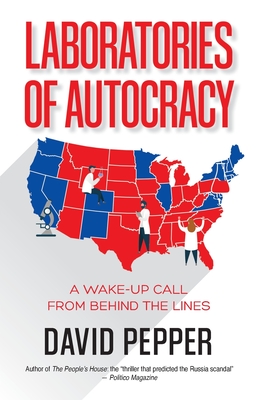By JULIE CARLE
BG Independent News
Political thriller author David Pepper briefly stepped out of fiction writing in 2021 to offer cautionary tale about a phenomenon in dozens of statehouses across the country, including Ohio.

His nonfiction book, “Laboratories of Autocracy: A Wake-Up Call from the Front Lines,” is a case study about the attack on democracy. His other books, including the recently released “A Simple Choice” have all been high-suspense fiction. Instead of focusing on Washington, D.C., incidents such as the Jan. 6, 2021, attack on the White House, “Laboratories of Autocracy” takes a real-life look at states as the center of the demise of democracy.
He recently asked an audience at Gathering Volumes bookstore in Perrysburg, “Hypothetically, what if we saw in another country, the rigging of districts so voting results were predetermined, usually leading to one party winning no matter what the voters said? If those in power changed the law to criminalize the way their opposition protested? If they stripped away power from any other body besides the legislature that rose to be a threat, including the courts? If they changed the rules for how judges are selected who are supposed to rule on what they do? Or if they simply ignored the rulings?
“My theory is, if we saw this happening in another country, we’d all recognize what was happening, and we’d say, ‘My god! Your country is in a full-out meltdown of democracy. You’d better do something about it right now,’” Pepper said.
Nothing is hypothetical about the scenarios he described. “You all are here. It’s happening in Columbus, Ohio, and in statehouse after statehouse, from Florida to Wisconsin to Missouri. It’s the reason I wrote this unplanned book,” he said.
Pepper served as chairman of the Ohio Democratic Party from 2015-2021, but he doesn’t just point at the Republicans for the current status. “This is not just a political battle of red (Republicans) v. blue (Democrats) that we play out every two years,” he said.
The Democrats believe that democracy is stable, and the real battle is winning federal elections. Their premise is that they represent the majority viewpoint on major issues such as climate change, common sense gun reform and pro-choice, so they focus on swing states and winning federal elections.
With wins in 2020 and 2008, “We celebrate like we’ve won the whole thing, and the media covers it this way. The celebration would be fitting if the other side’s battle was the same, but it’s not,” Pepper said. Because the other side takes a different view, Pepper believes there are actually two battles.
The Republicans’ battle is based on “the correct assumption” that democracy can be undermined in the U.S. and other countries. They also understand their viewpoint is the minority.
“When you put together that they know democracy can be subverted and that their viewpoints are in the minority, they know they would lose on a fair playing field. They don’t decide they just go to lose, they decide on a different battle. While Democrats’ battle is about election outcomes, Republicans’ battle is about democracy itself,” Pepper said.
“The key to doing that is in states and statehouse because states control every single issue we care about,” from what’s taught in schools to energy and climate policy, he continued.
The state writes the rules on who votes, how they vote, when they vote can they use one drop box or are there many. “And with the power of those rules comes the power to shape the electorate,” Pepper said.
In the book, Pepper outlines how state legislatures also have the ability to control the shaping of districts.
Statehouses have become “the perfect place to work on their game plan, and that’s exactly what they are doing,” Pepper said. “Once you are in, you change the rules, purge voters, suppress the vote, add voter ID requirements and gerrymander the hell out of every place so voters can’t throw you out, and you keep pounding away on all substantive issues knowing full well you don’t reflect the state majority viewpoint.”
He accepts that Republicans will continue to win the offensive battle over time in the state houses if the Democrats are on defense by focusing on the swing states to win federal elections.
As a nation, “we have to adjust,” he said. But he doesn’t see it as a party v. party issue; it’s a fight for democracy that will not change overnight.
“We are in the same historic struggle for democracy that we’ve always been in. It’s our nation’s history. This is no different than the suffragettes, Martin Luther King Jr., or John Lewis. We are in a battle for democracy itself,” he said.
Among the keys to fight for democracy in all 50 states is to make sure there are contested races from federal to state and local offices. The races go beyond the statehouse and include positions such as school boards, libraries, and courthouses.
“In Ohio, we have to run in all 88 counties, all districts, not because you are going to win everywhere but because it ensures that you have that check and balance,” Pepper said.
Grassroots efforts are key to making inroads, he said. As individuals everyone who cares about democracy, regardless of political affiliation, needs to determine how they can make a difference, whether it is knocking on doors, making donations, or asking local businesses and organizations to get involved.
He praised the Toledo and BG Persists grassroots groups that attended his talk for their continuous efforts to raise awareness and organize for progressive down-ballot candidates.
“What other parts of our footprint of influence in this world can we dedicate to lifting democracy? This is key to scaling up our fight for democracy by all of us figuring out our own footprint of influence,” Pepper said.





